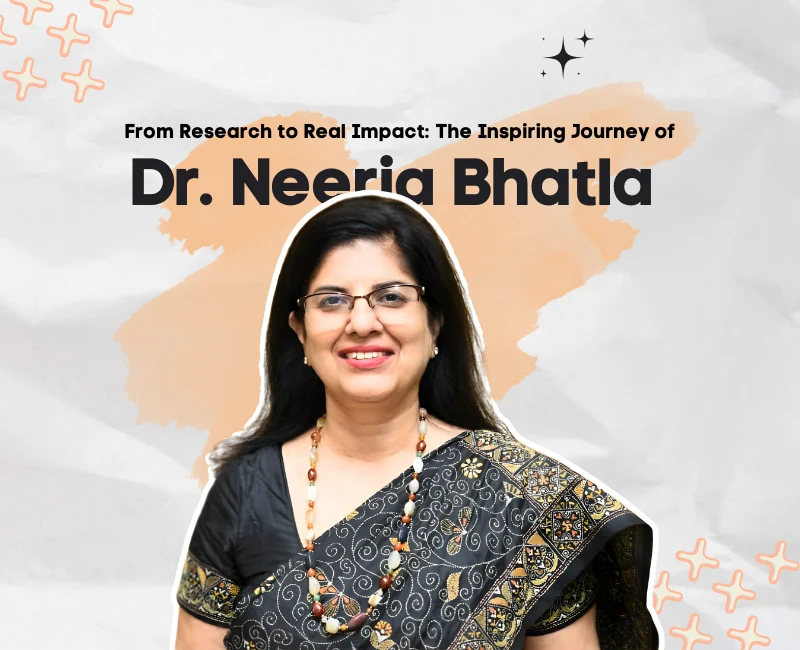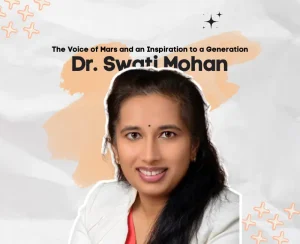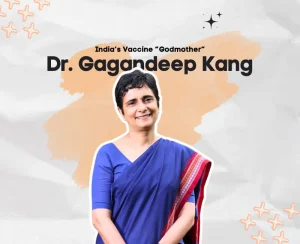From Research to Real Impact: The Inspiring Journey of Dr. Neerja Bhatla

We often think of doctors as people rushing through hospital corridors, saving lives, and working tirelessly for their patients. While that is true, some doctors go a step beyond. They don’t just treat and save patients; they change the future of healthcare itself. One such inspiring figure is Dr. Neerja Bhatla, a leading name in gynecologic oncology and cervical cancer research.
She is not just a doctor but also a mentor, researcher, and changemaker whose work has saved thousands of women’s lives. From dedicating her life to the early detection and prevention of cervical cancer to mentoring future doctors, her contributions to the medical field are truly remarkable.
Her journey shows us how passion, persistence, and compassion can bring about real impact in society. In this blog, we will share the inspiring journey of Dr Neerja Bhatla, from her beginning and research to her contributions and challenges.
Early Life & Academic Foundations
Born and raised in India, Dr. Neerja Bhatla showed a deep interest in medicine, not just as a career, but as a mission. She was fascinated by the science of healing since childhood.
Growing up in India, she saw how women’s health was often neglected. Many women silently suffer from illnesses, especially when it comes to reproductive health, either due to social stigma or lack of awareness. This strengthened her decision to enter the medical field.
Dr. Neerja completed her MBBS, but instead of choosing general medical practice like many of her classmates, she decided to focus on women’s health. She specialized in Obstetrics and Gynecology and later earned her master’s degree in Gynecology from the renowned AIIMS in New Delhi.
Choosing Gynecologic Oncology: A Field That Needed Attention
Gynecologic oncology wasn’t the most popular or glamorous specialty when Dr. Bhatla entered it. The field was very much ignored, which directly meant a lack of proper research and medicines for women. She interacted with women patients and realized how many of their health issues were overlooked or dismissed. She recognized the silent suffering of countless women dealing with cervical and ovarian cancers. This ignited her determination to focus on gynecologic oncology, a field that required deep research and human empathy.
In India, especially, cervical cancer remains one of the leading causes of death among women, largely due to late diagnosis and lack of awareness. Instead of seeing this as a very difficult challenge, she saw it as an opportunity to make a difference.
After finishing her MBBS and post-graduation in Obstetrics and Gynecology, Dr. Neerja began her career as a faculty member in the Department of Obstetrics and Gynecology at AIIMS, New Delhi. She later went on to lead the Gynecologic Oncology division at the National Cancer Institute, Jhajjar, under AIIMS.
For over 35 years, Dr. Bhatla has been dedicated to preventing and managing cervical cancer. Her expertise also extends to the early diagnosis and treatment of ovarian and uterine cancers. She worked on developing low-cost screening methods and also led public awareness programs. Her focus has always been on reaching underserved communities across India.
Stepping Into Research
While many doctors focus only on clinical practice, Dr. Bhatla’s curiosity led her deeper into research. In fact, research was at the heart of her journey. She believed that without evidence, medicine is incomplete. She used to spend long hours in labs, sifting through data, and experimenting with new approaches.
One of the biggest health challenges for her was cervical cancer because it is one of the leading causes of death among women. But the fact is, unlike some other cancers, it is preventable if detected early. However, lack of awareness, poor access to screening, and social hesitations often prevent timely diagnosis.
Dr. Bhatla dedicated her work to this issue. She wanted to find better, more affordable, and practical methods of screening and prevention.
She partnered with global institutions such as IARC, Johns Hopkins University, University of Michigan, Arizona State University, and Duke University to advance research and training.
Breakthrough Work in Cervical Cancer: HPV Screening & Vaccination
One of her key contributions was developing affordable screening methods for cervical cancer, making early detection possible even in rural areas with limited medical facilities.
Traditionally, screening required advanced labs and costly equipment like Pap smears, which were costly and not always feasible in rural or low-income areas. To address this, Dr. Bhatla pioneered low-cost, innovative approaches such as HPV DNA testing. Her groundbreaking work on HPV screening and vaccination became one of her most significant achievements.
The best part is that, unlike Pap smears, HPV testing can be conducted with fewer resources and even allows for self-sampling methods. It made screening more accessible to women who would otherwise avoid it due to stigma or logistical challenges. This gives women a greater sense of privacy and comfort.
She also chaired the Gynaecologic Oncology Committee of the Federation of Obstetric and Gynaecological Societies of India (FOGSI). During this time, she helped develop resource-based guidelines for cervical cancer screening, treatment, and HPV vaccination, with a focus on low-resource settings.
Impact Beyond Research
Dr. Bhatla’s work extends far beyond treatment and research. She has been deeply involved in awareness campaigns, spreading the message that prevention is possible and that women should not shy away from talking about their health.
Alongside screening, Dr. Bhatla has been an advocate for the HPV vaccine, which can drastically reduce the chances of cervical cancer. Her research and contribution were not just about treating a disease but preventing it in the initial stage itself. She worked tirelessly to generate evidence and spread awareness about the vaccine’s effectiveness. She believes doctors must guide patients, especially adolescents, as vaccination at a young age ensures the best protection.
The combination of HPV-based screening and vaccination represents a breakthrough in women’s healthcare in India. Over the years, her studies have influenced global cervical cancer prevention guidelines, showing how research in India can make a worldwide difference.
Launching India’s First Validated HPV Test Kits
A remarkable milestone was achieved in April 2025 with the introduction of India’s first internationally validated indigenous HPV diagnostic test kits. This development marked a turning point in the fight against cervical cancer, as it brought affordable and highly sensitive screening tools within reach of millions of women.
From Research Papers to Real-World Change
What sets Dr. Bhatla apart is not just the number of research papers she has published, but how that research translated into actual change. She collaborated with global health organizations, contributing to international guidelines for cervical cancer prevention and care. She actively worked with governments and advocacy groups to spread awareness about screening and vaccination.
She led community-level mass screening and prevention camps in Delhi’s resettlement colonies and urban slums and championed the idea of “screen-and-treat” models. Through her efforts, many Indian states introduced organized screening programs and started conversations around affordable HPV vaccination.
Global Impact on Gynaecologic Cancer Management
Dr. Bhatla not only made a mark in India, but she also made history internationally. Through screening and prevention efforts, Dr. Bhatla has helped detect pre-cancers early, allowing immediate treatment. Her community camps have reached women who otherwise had no access to care.
She became the first Indian to serve as the President of the International Federation of Gynaecology and Obstetrics (FIGO).
Under her leadership, FIGO took critical strides:
- The organization developed a Gynecologic Cancer Management Map, an app offering standardized, evidence-based guidance to practitioners globally.
- She led the 2018 revision of the FIGO cervical cancer staging system, ensuring globally consistent reporting and treatment protocols.
Challenges Along the Way
No trailblazer journey is free of challenges, and Dr. Bhatla’s path was no different. She also faced several challenges, including:
Limited Awareness: Talking about women’s reproductive health in India was, and still is, a sensitive subject. There was very little awareness of this topic. In that situation, encouraging women to step forward for screening was not easy. There was always a hesitation and shyness that she had to deal with to motivate women.
Social Stigma: Women’s health, especially related to cervical or reproductive issues, is often tied up with cultural taboos. Talking about cervical cancer, HPV infection, or even routine gynecological check-ups was often considered taboo. So, convincing communities that prevention is better than cure requires patience, empathy, and persistence.
Urban-Rural Divide: Urban hospitals had the infrastructure and resources for cancer care, but in rural areas, even basic screening facilities were not present. Designing strategies that were practical in villages with limited electricity, equipment, or trained personnel was a constant challenge. Plus, the cost could not be high due to the low income of villagers.
Resource Constraints: Unlike developed countries with advanced labs and unlimited funding, research in India often struggles with budget limitations. Running large-scale studies with limited resources was challenging due to tight budgets, lengthy approvals, and the need to prove cost-effectiveness before national rollout.
Resistance to Change in Medical Systems: Introducing new protocols like HPV DNA testing or updated cervical cancer staging guidelines was very difficult. Many clinicians were hesitant to move away from the traditional methods they had practiced for years. Spreading these changes across India’s diverse healthcare settings required patience and persistence.
But instead of letting these challenges discourage her, Dr. Bhatla turned them into motivation. Through workshops, awareness drives, and educational campaigns, she has encouraged open conversations about cervical cancer and the importance of regular check-ups. Her advocacy has played a key role in normalizing the discussion of HPV vaccination in schools, families, and health programs.
Mentorship and Leadership
As her work gained attention, Dr. Bhatla became a reputed voice in both Indian and international medical circles. She took on leadership roles, not only conducting research but also mentoring young doctors and researchers.
As a teacher and mentor, she has guided countless young doctors, encouraging them to think beyond conventional treatment methods. She even contributed to important panels and organizations, including the World Health Organization (WHO), which sets global health standards.
Dr. Neerja has also stood up for women in medicine. In a field mostly led by men, she made her mark with quiet strength and inspired young female doctors to dream bigger. She also represents India on national and international platforms, sharing her voice in global discussions on cancer care.
Recognition and Awards
Over the years, Dr. Neerja Bhatla’s contributions have been recognized nationally and internationally. She has received awards and honors not just for her research, but also for her service to society.
Padma Shri (2025)
In 2025, Dr. Bhatla was honoured with the Padma Shri, one of India’s highest civilian awards, acknowledging her decades of service in cervical cancer prevention and women’s reproductive health.
Other Awards
- Dr. S.K. Ghai Bhandari Award, presented by the All India Coordination Committee of the Royal College of Obstetrics and Gynaecology.
- ISCCP Excellence Award (Indian Society of Colposcopy and Cervical Pathology)
Continuing the Mission
Even today, Dr. Bhatla continues her mission with the same passion and mindset she started with. The landscape of cervical cancer prevention is changing with new vaccines, technologies, and policies, and she remains at the forefront of these developments. Her inventions and contributions continue to save thousands of women from the threat of this disease.
She reminds us that medical research is not just about numbers and graphs; it’s about real people. It is about finding ways to ease their suffering and improve their lives.
Lessons from Her Journey
Dr. Neerja Bhatla’s journey teaches us many valuable lessons:
Purpose Gives Direction: Her journey shows that when you dedicate yourself to a meaningful purpose, your efforts create long-lasting impact and help millions.
Persistence Pays Off: Research takes time. Results don’t appear overnight, but persistence can overcome resistance and lead to breakthroughs. Hard work and consistency are important.
Context Matters: Solutions need to fit the environment they are meant for. Her low-cost screening methods are proof that innovation doesn’t always mean expensive technology.
Breaking Stigma is Possible: With patience, awareness, and persistence, even sensitive health topics like cervical cancer and reproduction can be brought into the open.
Prevention Saves Lives: Her career proves a simple truth: prevention is always better than cure. Screening, early detection, and vaccination are small steps that lead to life-saving results.
Conclusion
Dr. Neerja Bhatla is one of the most renowned names in the medical field, especially when it comes to women’s health. From the lecture halls of medical colleges to rural villages in India, Dr. Neerja Bhatla’s journey is nothing short of inspiring. She played an important role in developing and promoting HPV screening and vaccination, a breakthrough that has helped save many women from cervical cancer. She has also made sure these solutions are not just for big hospitals or the wealthy but also reach women in rural areas. Her efforts have saved lives, given women strength, and started important conversations about reproductive health that were ignored for too long.


